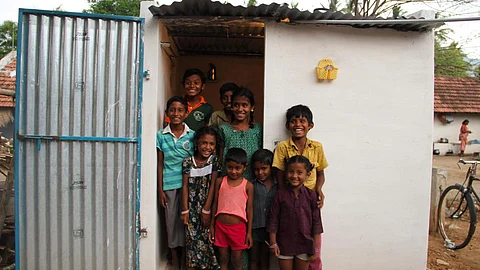
- Topics
- Feature
- Opportunities & Events
- Data
- Hindi Portal
- Topics
- Feature
- Opportunities & Events
- Data
- Hindi Portal

In 2022, FINISH Mondial and the Sanitation Learning Hub (SLH) conducted a participatory and immersive research study to understand ground realities and lived experiences of sanitation and hygiene access in Nandurbar district, Maharashtra and Darbhanga district, Bihar in India.
The main objectives for the immersion were to identify challenges and barriers towards access to and use of sanitation and hygiene services within challenging contexts, capture community voices and find contextually rooted ways to identify enablers towards safe and equitable access to and use of sanitation and hygiene services in these areas; and inform FINISH programme design and support the development of human-centric strategies for improving access to sanitation hygiene services for marginalised and left-out communities, while strengthening gender equality and social inclusion (GESI).
The authors have synthesised the findings from the thrust areas and suggest following recommendations to address the problems surrounding universal access to water, sanitation and hygiene (WASH) services in challenging contexts.
Contextual and local challenges such as socio-economic divides and prevalent attitudes and beliefs should be factored in the communication and sensitisation campaign. Recognising the diversity of social norms and cultures, contextualised messaging voiced by local leaders should be designed with a human-centric approach at micro levels. It is important to address these barriers while recognising intersecting issues beyond sanitation and hygiene.
Simplifying toilet technology, with a focus on the substructure (below the ground), for both users and masons is important to promote sustainable toilets and to ensure safe management of human waste.
WASH programming should also integrate gender equality interventions with a focus on adolescent boys and gender roles and norms. For example, menstrual hygiene management interventions should include boys and young men in the conversation.
Water is inherently linked with sanitation and hygiene, both in terms of availability and quality. Jal Jeevan Mission (JJM) provides an opportunity to strengthen these linkages. While a household tap water supply can improve water availability and hence toilet use, safe technology options should be marketed for their impact on groundwater quality during floods or in tough terrain. Village Water and Sanitation Committees or Water User Committees provide an opportunity to not only support JJM interventions but also work towards sustainability of sanitation and hygiene supported by non-governmental organisations (NGOs) and the government.
Citation: Sneha, S. and Sen, S. (2023) 'Immersive Research for Safer Sanitation in Bihar and Maharashtra, India', SLH Learning Paper 14, The Sanitation Learning Hub, Brighton: Institute of Development Studies, DOI: 10.19088/SLH.2023.009
Rights details: Available under Creative Commons (CC/BY-NC/4.0)